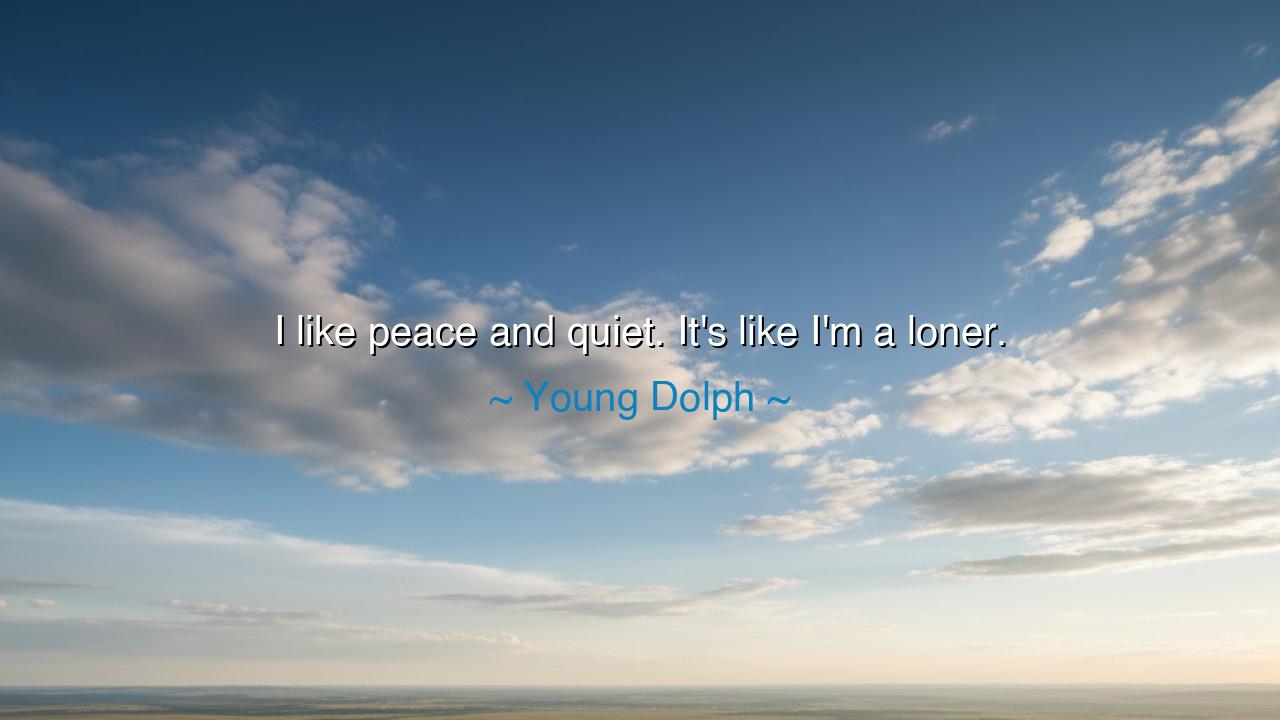
I like peace and quiet. It's like I'm a loner.






Young Dolph, the voice of struggle and triumph, once confessed with disarming simplicity: “I like peace and quiet. It’s like I’m a loner.” These words, spoken by an artist who lived amidst the noise of fame, fortune, and danger, strike at an ancient truth: that within the soul of every human lies a yearning for stillness. For peace and quiet are not mere absences of sound — they are the sanctuary where a man may hear his own thoughts, where he may weigh his heart, where he may rediscover himself. To be a loner, in this sense, is not weakness but strength, the strength to dwell apart and to seek clarity in silence.
The ancients honored such solitude. The Stoic philosophers sought stillness of mind amidst the clamor of cities and empires. Marcus Aurelius, though emperor of Rome, often retreated into the temple of his own thoughts, writing meditations that echoed through the ages. He, too, sought peace and quiet, not as an escape from duty, but as the wellspring from which duty could be carried out with wisdom. In the same way, Young Dolph reminds us that to be alone at times is to be fortified, to step away from the chaos of the world and listen to the voice of one’s own soul.
History is filled with those who understood this paradox. Consider George Washington, the general and president. Before leading armies or guiding a new nation, he often retired to Mount Vernon, to walk in his fields, to hunt in his forests, to think in silence. He was surrounded by demands, yet he knew that only in quiet could he prepare himself for the storm. In such solitude he found the strength to return to the clamor of war and politics. Washington’s stillness became his fortress.
And yet, solitude can be misunderstood. The loner is often judged as aloof, disconnected, or even weak. But the ancients and the wise knew otherwise. The hermits of the deserts, the monks of the mountains, and the poets of solitude all proved that to withdraw is sometimes the highest act of strength. For the one who fears being alone is enslaved to the crowd, but the one who embraces solitude learns freedom. Young Dolph’s words are not of despair, but of recognition: the world is noisy, and in its storms he sought his harbor.
Children of tomorrow, hear this: do not despise solitude. Do not fear the silence where your heart speaks to you. For in stillness the soul grows, and in solitude, clarity is born. If you are always surrounded by voices, how will you know which one is your own? If you are always lost in noise, how will you recognize the sound of truth? To cherish peace and quiet is to choose wisdom over distraction, strength over chaos.
The lesson is clear: seek balance. Do not flee forever from the company of others, for community also gives life. But do not drown in it either, lest your soul be lost. Let solitude be your teacher, and peace your companion. In moments of silence, examine your path, renew your strength, and prepare to walk once more among men with purpose and resolve.
Practical action flows from this wisdom. Carve out moments each day where you embrace quiet — leave behind the noise of devices, the chatter of crowds, the endless pull of the world. Walk alone beneath the sky. Write your thoughts. Pray, meditate, or simply breathe. Let solitude cleanse your spirit, so that when you return to the world, you do so with clarity, not confusion.
So let it be remembered: “I like peace and quiet. It’s like I’m a loner.” These are not the words of weakness but of strength, not of despair but of wisdom. For the loner who seeks peace is not lost — he is listening. And in the silence he discovers the deepest treasure: himself.






AAdministratorAdministrator
Welcome, honored guests. Please leave a comment, we will respond soon